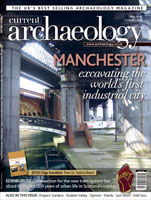This issue of Current Archaeology contains our annual Digs special, chock-full of all the information you need to get digging this summer, or plan a day out to see what’s happening in your local area. Have fun ‚ and if you participate in an excavation or just visit one, tell us what you thought on ilovethepast.com.
Appropriately, our features this month focus on excavations, leading off with big digs in three of the UK’s largest cities: Manchester, London and Edinburgh. Deep urban stratigraphy contains layer upon layer of information. This month’s articles show how archaeology can shed light on everything from the evolution of industry in Manchester to the lifestyle of London’s early inhabitants, and the many stages of Edinburgh’s development. We close the issue by hearing about a ‘first dig’ experience: how wonderful it is to be reminded of the thrill of first picking up a trowel.
Finally, we would like to thank everyone who participated in Archaeology 2010. See you next year!
News
Bronze Age Shipwreck
Neolithic stone rows
Roman York’s African
Abbey Road Studios
Salisbury’s puzzling inscription
First Treasure Act conviction
Colchester’s chariot track
Time out for Time Team?
Features
Manchester: Dark Satanic Mills?
A decade of rescue and research projects chart the growth of this great industrial city.
Draper’s Gardens: Unearthing the lives of Roman Londoners.
An interim report from this remarkable site reveals its post-Boudiccan reconstruction.
Edinburgh: Slicing through 1,000 years of urban life.
Construction work for a new tram system has uncovered the roots of Scotland’s capital
Duddon Valley: Diary of a dig: a novice’s view.
The first tast of dirt archaeology is different for everyone; here, a trowel’s edge view.
Regulars
Conference Overview
The verdict on Archaeology 2010 and the Current Archaeology Awards
Book Reviews
European Influence on Celtic Art
Caesar’s Druids
The Iron Age Roundhouse
The Early Medieval Church in Wales
Sherds
Chris Catling’s irreverent take on heritage issues.
Last Word
Andrew Selkirk finds that the archaeology of climate change is more complicated and controversial than it is generally made out to be.
Odd socs
The Charles Close Society

